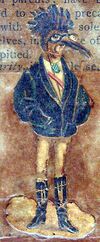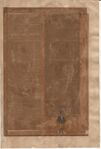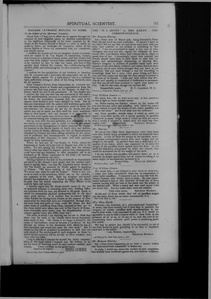Madame Leymarie replies to Home
To the Editor of the Spiritual Scientist:
Dear Sir: — I beg you to allow me to oppose through the columns of your impartial paper, an absolute contradiction to the malicious falsehoods of the letter inserted by M. Home in the Sunday Herald of March 12, 1876, in which he seeks to injure my husband—M. Leymarie, editor of the Revue Spirite of Paris—by statements that are completely and utterly untrue.
I reaffirm for myself and for my daughter Jeanne Leymarie, what we stated to M. Van Raalte of Amsterdam, namely, that Firman is a medium of much power, and that Jeanne had seen “the little Indian” several times sufficiently materialized to be touched by her, to take her hand, and then to Slip quickly back behind the curtain, like a child playing with another ehild, and addressing her on each occasion as “Little Jeanne.”
I reaffirm for the satisfaction of our brethren in America, that M. Leymarie and I have seen the same spirit, not as M. Home falsely asserts “in a dark seance” but in a subdued light, sufficiently strong to allow of his being distinctly seen by all present.
After Firman’s Return from Amsterdam, he received several charming letters of thanks and congratulations from the persons who had been present at his seances, in that city; letters, which are still in his possession. M. Van Raalte was I believe, the only one who was not convinced of the reality of the manifestations, because in a seance, which was held in his house, the accordeon, trumpet, bell, &c., used at the seance, were found to have been marked by teeth. But all who are conversant with the subject will doubtless agree with me that such marks are not a conclusive proof of fraud, for two reasons; ist, because we are mv no means sure that spirits may not as easily use their teeth for such manifestations as their hands; and 2nd, because it is impossible to prove that such marks may not have been made by the teeth of someone among the company assembled.
But as, even with the best mediums, it is impossible to be too warily on our guard, and in order to insure the utmost precaution in the management of future seances, M. Leymarie inserted in the Revue Spirite of April, 1875, two notices, one by Count de Bullet, affirming the fact of materialization obtained by Firman, the other calling attention to the necessity of prudence and circumspection in regard to reputed phenomena of this character, in order that both opinions might be fairly represented.
When we last saw M. Van Raalte, in Paris, (about the beginning of April, 1875) the trial of Buguet was still in the future. No one, among the friends here, had the faintest idea of what was about to happen; and no one, consequently, could have had any intention to offer pecuniary aid to my husband, as M. Home insinuates in his letter; an insinuation equally gratuitous and false.
Having replied to the first of the falsehoods so imprudently put forth by Mr. Home, I now assert that his second statement is equally false; one that Mr. Leymarie never stated to Mr. Van Raalte (as asserted by Home again) in speaking of Firman: “We know nothing of that American fellow. We never saw what he calls his Indian.” There is not one word of truth in the assertions, which are, on the contrary, the opposite of the truth. Both my daughter and myself declare the statements of Mr. Home in regard to the denial he puts into her mouth respecting the “little Indian” to be entirely false and untrue.
I heartily regret that Mr. Horae should resort to the use of poisoned weapons in attacking, those who, holding different opinions from his own, are devoted to the great cause to which his remarkable physical mediumship has in the fast done good service. It is evident that he cannot forgive Allan Kardec for having been chosen as the channel of communication for ideas that were not transmitted through him; but even from that point of view, could Mr. Home not find some mode of attacking those ideas, opposed as they are to the views which have taken him over to the Church of Rome, more honorable, more manly, than the dissemination of calumnies against those who differ from him?
The letter to which I am replying has led me to think that there may be truth in the remark which has so frequently been made of late. “Mr. Home is no longer a friend to the cause of Spiritualism; since he became a Catholic he has become an enemy to the movement with which he was at first identified, and would fain undo his own work.” But it needs not the gift of prophecy to announce to him that the only result of the employment of such weapons as those to which he has recourse will be worthy of those weapons and those who use them.
I beg to add that I assume for myself the entire responsibility of this reply, which I request you, Mr. Editor, to do me the favor of inserting entire in your earliest number, and remain,
Yours cordially in the great cause,
(Signed on the original.)
7 Rue de Lille, Paris, France, March 31, 1876.
The Seeress of Endor
Unlike most of the world, I profess to have a profound respect for the woman of Endor, commonly known as the “witch” or the “old witch.” Her story is a very brief one. She comes upon the stage but once; figures in a drama of transcendent interest as a star actress; then this scene changes, and she is known no more. But in the course of that brief space, and as the prime mover in that astounding scene, she achieved for herself a name that will never die — one familiar alike to the ears of old and young, wherever the Bible record has penetrated or will survive.
This woman may or may not have been old. Brother Moody says she was, and as the Bible does not expressly contradict him, we will not. Brother Moody says she was a witch; the Bible says she was reported “to have a familiar spirit,” but it does not say she was a witch—on the contrary, seems to draw a line of distinction between “those who have familiar spirits and wizards." There is no record that she had ever practiced sorcery. She could not openly do so at the time and live.
But she had a familiar spirit; in other words, was possessed of that peculiar physical organization, as much decried now as in the days of Saul, but which was found then, is now and will be, probably, for all time, — the faculty of invoking, seeing, and communicating with spirits. No one can deny that this faculty has existed, in exceptional cases, and yet be a believer in the Bible or received History. If so, when and how did it cease to be operative? Where is the line of demarcation between the old dispensation and the new? Is there any more reason to dispute the possibility now than at the time when she of Endor demonstrated it to be a fact, it is not a question of belief or disbelief, not one capable of demonstration or disproof.
Well, this woman was neither more nor less than a medium, — probably of mature years, good bodily strength and presence; possibly, not inferior in physical endowments to the beautiful race of women common to the place of her nativity. Her mental gifts must have been extraordinary. She was apparently fearless and self-contained in the presence alike of the dead and the living—the prophet of God and the monarch of Israel. With quick perception she takes in the whole dread scene and its significance, even in that fearful moment when the spectre form of Samuel rises into view; with unblanched cheek, she strikes through the disguise of the monarch with the simple expostulation, “Why hast thou deceived me, for thou art Saul!”
Where in all history is there an instance of composure like this under circumstances equally trying. How few can stand in the presence of one who has the power of life and death, or of those who have re-passed the gate of death, and act calmly and firmly as before.
Observe, too, the feminine qualities this “old witch” manifested—the hospitality of bed and board, her tender solicitude for the crest-fallen king, and care of his enfeebled frame. She did not offer him a broomstick, upon which to fly away from the place — perhaps had no such steed to offer — but she did for him all that the tender heart of woman could suggest, and sent him away comforted, as well as her ability to do so could avail.
If there be blot or stain upon the life of this seeress of Endor, it must be found outside of the Bible record; for not a word of reproach is there, or can justly be inferred from the narrative. The time has been, and it is so io less degree now, when her abnormal gift arouses a spirit of persecution against the possessor. Children have been severely punished for it by Christian parents; have been driven from their homes, and obliged to seek a precarious support for themselves, sometimes with this as a sole means of maintenance If deceived themselves, in the face of so much trial, they are all the more to be pitied.
A little more charity, if you please, Brother Moody!

...
Editor's notes
- ↑ Madame Leymarie replies to Home by Leymarie, Marina and Jeanne, Spiritual Scientist, v. 4, No. 8, April 27, 1876, p. 93
- ↑ The Seeress of Endor by unknown author (signed as J.), Spiritual Scientist, v. 4, No. 13, June 1, 1876, p. 153. The original title is not pasted and substituted with "The Witch of Endor".
- ↑ image by unknown author. Bird-man
Sources
-
Spiritual Scientist, v. 4, No. 8, April 27, 1876, p. 93
-
Spiritual Scientist, v. 4, No. 13, June 1, 1876, p. 153



